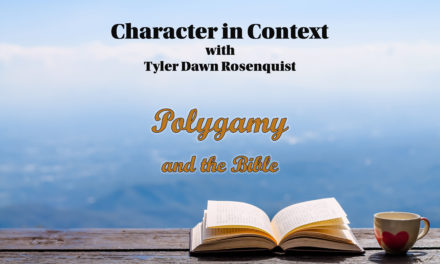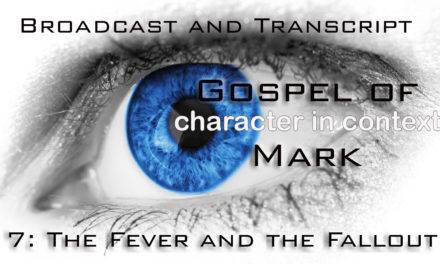You won’t want to miss this episode! This is the beginning of a teaching series on one of the most uncomfortable sections of the Gospels–the seven woes of Matthew 23. Uncomfortable because we either like to box in Yeshua/Jesus as entirely meek and gentle or, conversely, because some people use this one section of Scripture–which served a unique cultural function that is no longer appreciated–as an excuse to behave boorishly toward anyone who disagrees. But polemic was well understood in the Hellenistic world and was widely used in verbal battles not only between Jews and Gentiles, but between Jews and Jews! We’re going to look at examples from Gentile philosophers, as well as Jewish writers like Josephus, Philo, and the authors of the Qumran scrolls (commonly known as the Dead Sea Scrolls). How did Yeshua’s polemic measure up to the standards of the day? Let’s take a look.
Here’s a very unpolished abbreviated transcript
************
…what they say, they do not do
aren’t willing to lift a finger
All their works they do to be noticed by men
Hypocrites
son of Gehenna
blind guides
fools and blind ones
whitewashed tombs
full of hypocrisy and lawlessness
you are sons of those who murdered the prophets
snakes, you brood of vipers
your house is left to you desolate…
These are some of the most damning words in the Bible, against anyone. And they came out of the mouth of our meek and humble Messiah toward the Pharisees and Scribes. People either grab hold of them as an excuse for their own daily behavior, or they just try and ignore the whole chapter—but let’s look at it head on. So what exactly was “polemic” in the Hellenistic world and why aren’t we generally reading this in the spirit it was offered—either being way too harsh or being way too excusing? What, in short, was our Savior trying to communicate two days before the Passover and His death? And how did it differ from His behavior before all this, and why?
Hi, I’m Tyler Dawn Rosenquist and welcome to Character in Context, where we explore the historical context of Scripture and talk about how it bears on our own behavior and witness as image-bearers. You can find my teachings on my websites theancientbridge.com and contextforkids.com as well as on my youtube channels, accessible from my websites. You can also access past broadcasts on my podcast channel characterincontext.podbean.com and my context books for adults and families are available through amazon.com.
So, those were some harsh words and they stand in stark contrast with the Beatitudes and the Fruit of the Spirit. They were insulting, accusatory, and inciting trouble. Yeshua/Jesus came to Jerusalem for the express purpose of having a showdown with the Jerusalem elites, who had been testing Him and trying to trap Him throughout His Galilean ministry in the north. Indeed, the synoptic Gospels never show Yeshua in Jerusalem until that fateful Passover and it is only John who records any other trips up to Jerusalem at Feast times. This is because the Synoptics are building a narrative that shows a progression from Yeshua being a relative nobody from nowhere, and growing in popularity in the north, attracting enough attention that elites from Jerusalem are dispatched to test Him, and finally riding into Jerusalem in triumph, surrounded by Galilean pilgrims—much to the disgust and worry of the Jerusalem leadership. Before this time, in the Gospel of Matthew where we will be focusing, it is notable that Yeshua isn’t the one picking fights—He just finishes them. But now, for the past couple of chapters, He has been on the offensive, outright provoking the elites. Why? It is time for Yeshua to die. Before now, He has wisely picked His fights carefully, even evading confrontation or altogether escaping it. But He has come to Jerusalem for a purpose, and that purpose is to die for the sins of the world, to defeat death and sin in the greater second exodus—where the entire world, and not just Israel, is freed from slavery to sin, death, and false gods. We will talk about that more in the future when we get to the Gospel of Mark.
So, pretty harsh language. Pretty shocking from our sweet, humble and meek Messiah. But, would it have been shocking in those days? Not like it shocks us, no.
Today we’re going to talk about the very entertaining subject of “polemic” in the ancient world, or maybe better described as “Hellenistic insults.”
Now, it sometimes shocks people to think of first-century Jews as Hellenistic—I mean, a lot of people use the phrase “Greek thinking”—not knowing that Jewish thought in the first century was entirely permeated by Greek thought. In fact, we really have no clue what genuine Jewish thought without the Greek influences really looked like. Synagogues were a product of Hellenism, Rabbis and disciples—Greek, the emergence of Torah becoming seen as Law codes over wisdom literature, the focus on Torah readings and study—Greek, the whole idea of making grand tombs for the prophets and martyrs–Greek. Not everything “Greek” is pagan, or bad.
Polemic, or what we see in Matthew 23, is classically Greek. We see it throughout the time period in the writings of Jews and Gentiles, from the NT, to Josephus in Against Apion, and Philo’s The Embassy to Gaius, to the writings of Cynics, Stoics, and Epicurian philosophers. In short, in the ancient world, where differences in philosophies clashed, polemic was sure to be a part of it.
As part of my studies into Matthew 23, I happened across a reference to an excellent article by Luke T Johnson, professor of New Testament and Christian Origins at Candler School of Theology. It’s called The New Testament’s Anti-Jewish Slander and the Conventions of Ancient Polemic and it is available through JSTOR.org. This article was great because it didn’t delve into any theology—made no excuses and didn’t even address the charges against the Scribes and Pharisees—all it did was talk about the literary form of polemic during those times. If you enjoy reading about philosophers tearing each other apart with insults, then this will be highly enjoyable reading for you.
Before anyone objects to the term philosophy—don’t think about modern college philosophy professions and programs. Don’t think about metaphysics, think about morals. In the Hellenistic first century, the philosophical life was about leaving vice behind and pursuing virtue—regardless of religious sensibilities. As Johnson states, it was the “quest for health by those morally ill.” That being said, no one could agree on how to do that and so whatever group you were with, the other groups had to be classified as dangerous and even depraved. Josephus described the different sects of Judaism as competing philosophies—Essenes, Sadducees, and Pharisees (broken down into Hillelites and Shammites). That’s how He saw it from within, as a member of the priestly caste within Judaism who self-reported that he tried out each one to decide which he liked best and became a Pharisee.
An example of some of the rhetoric against the sophists by Dio of Prusa (40-120 CE):
“ignorant, boastful, self-deceived” (Or. 4.33) … “unlearned and deceiving by their words” (4.37) … “evil-spirited” (4.38) .. “impious” (11.14) … “liars and deceivers” (12.12) … preaching for the sake of gain and glory and only their own benefit (32:30). They are flatterers, charlatans, and sophists (23:11) … they profit nothing (33.4-5) … they are mindless (54.1), boastful and shameless (55.7), deceiving others and themselves (70.10), demagogues (77/78.27)
Aelius Aristedes (117-181 CE), a sophist, had some choice words about philosophers:
“they despise others while being themselves worthy of scorn. They criticize others without examining themselves. They make a great show of virtue and never practice it” (307.6). He says they have the outward appearance of virtue but are inwardly corrupt (307.10). They are only after pleasure and wealth (307.15; 308.5). They are flatterers (308.10). In contrast to sophists (for him a good word), “they have never thought of or spoken discourses profitable to their contemporaries, never praised the brilliance of feasts, never honored the gods, never counselled cities, never consoled the afflicted, never worked for peace, never addressed exhortations to the young or those who have been banned, never observed the conventions in their language.”
Now, this is important. Johnson points this out: “polemic has nothing to do with specific actions, but typical ones. Any teacher of whom you disapprove can be called a sophist or charlatan”
That is to say—this was largely rhetoric that was scripted and only modified slightly to suit one’s opponent. I have pointed out in other teachings that in the ancient world, stereotypes were shamelessly employed by everyone—by our modern sensibilities, which they did not share. They didn’t care about accuracy, or about hurt feelings, or any of that, or even if it was true or not. The goal was to promote their philosophy at all costs and to damage the philosophy of everyone else by calling everything the other side did into question. Like I said, it was mostly scripted. There were things that one said about enemies, whether it was true or not. Everyone knew the rules of the game. You know, like modern political pundits. Only the people poisoned by the koolaid believe everything that these guys say about the other side.
Polemic was just one facet of the endless series of debates between competing philosophies.
Epicurian Colotes called some rivals “buffoons, charlatans, assassins, prostitutes, nincompoop.” Plutarch retaliated with the charge that the Epicurians had prostitutes in their community.
I could go into a lot more examples, but after a while, you would begin to recognize a topos, which means “a standardized treatment of a subject.” As I said before, it just means that there was a general script of insults and accusations that commonly come up in the arguments between rival philosophies. For example, one of the most popular jibes was that rivals were lovers of glory, money, and pleasure—and some of that ought to sound very familiar to NT readers. Yeshua uses it, and so does Paul.
So, what was the real purpose of polemic? Was it to tear other people apart? No, that’s how it is used among the uninitiated on social media, but that is never the true goal of polemic by those who wield it best.
Polemic is all about saying, “I/my school/my teacher/my philosophy is the best. Don’t listen to these other guys.”
In essence, if anyone other than God or His chosen emissaries say it, it is boastful and dead wrong. The Pharisees, Sadducees, Scribes, and Essenes all did this in their public wrangling. However, everyone was an amateur compared to the Essenes. Oh my gosh, you want some vitriolic reading—check out the Dead Sea Scrolls and look at how the Essenes pretty much damned everyone in the world to hell and beyond in their writings. Only they were good, true, elect, the sons of light and everyone else could only aspire to be them. It’s actually pretty offensive.
But when it came out of Yeshua’s mouth—it served two purposes. (1) it marked Himself off as the only one true teacher, (2) He was provoking His own death. That last one should sober everyone up who likes to go out insulting people every day and then go back to their social media wall complaining about being blocked, unfriended or called on the carpet for behaving badly. Yeshua didn’t do this until the time came to provoke His own death. We should be similarly as committed to the consequences of our own words. We should also realize that what worked in the first century is not effective in modern culture and is not perceived in the same way. Yeshua was exalting Himself, rightfully so, but exalting Himself and His “philosophy” over and above everyone else’s, literally assigning them to a lesser and even deviant standard. He wasn’t denouncing every single Pharisee and Scribe. Remember what Professor Johnson said, “polemic has nothing to do with specific actions, but typical ones. Any teacher of whom you disapprove can be called a sophist or charlatan.” Yeshua addressed typical behavior for Pharisees and Scribes, not the behavior of any single Pharisee or Scribe. This was about generalizations. In verse 12, we are going to see that Yeshua knew exactly what He was doing, and what the consequences would be.
Let’s read all of Matthew 23, and then I am going to talk about some of the polemic writings of Josephus, Philo and the Essenes for similarities.
Remember that the purpose of polemic was denouncing rival teachers and establishing one’s own philosophical school as the only legitimate one. And as Josephus might say, you can add “Messianism” to the list of “philosophical schools” within Judaism, again, philosophy meaning a moral system and way of life in Hellenistic times.





















